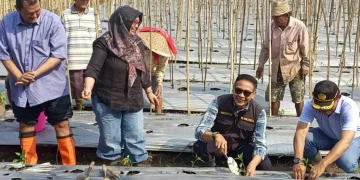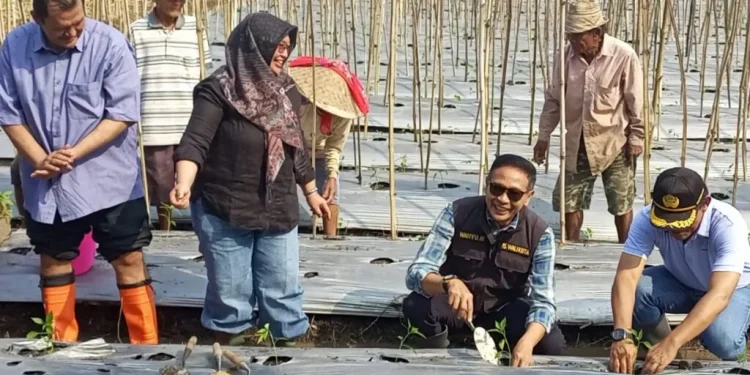Malang City is taking decisive steps to address inflationary pressures caused by fluctuating chilli supplies. Recognizing the importance of this essential commodity, Punjabat (Peejay) Wali Kota Malang, Dr. Ir. Wahyu Hidayat, M.M., in collaboration with the regional team to control inflation (TPID) and local farmers’ groups (Gapoktan), initiated the planting of 10,000 chilli seedlings. The effort, carried out on a dedicated 3,500 square meter site in Kelurahan Bumiayu, Kedungkandang, demonstrates the city’s commitment to increasing agricultural production.
Dr. Wahyu Hidayat highlighted the importance of this initiative, saying, “Chilli pepper can be harvested three and a half months after planting, and subsequent harvests can be done up to eleven times. This will significantly increase the chilli supply in Malang City.”
Despite these efforts, Malang’s current chilli production, covering both large chillies and smaller varieties such as cayenne pepper, does not meet the city’s annual requirement of more than 1.5 tons. Currently the harvest is only about 1.5 tons per year. To fill this gap, Dr. Wahyu is encouraging more extensive planting of chilli peppers among local farmers and promoting regional cooperation, especially with Malang Regency and Probolinggo.
Moreover, the problem of inflation extends beyond chili peppers. The supply of garlic and onions is also critical as Malang relies heavily on produce from Probolinggo due to local challenges such as limited suitable land and less favorable geographical conditions for growing these crops.
Slamet Husnan, director of Malang City’s Agriculture and Food Security Office, noted that while the city is not facing a shortage, there is only enough produce for 1.5 hectares of municipally owned land used by farmers, which covers an area of about 40 hectares. tons He emphasized the strategic importance of maximizing production in areas suitable for growing specific chillies: rain-fed areas for small chillies and irrigated areas for large chillies.
According to the latest data from the Malang City Agriculture and Food Security Office, as of the first week of June 2024, the city had a stock of 12.25 tons of large chillies against a requirement of 9,103 tons. Supply fell marginally to 11.87 tonnes in the second week, while demand remained stable at 9.10 tonnes. For cayenne pepper, supply in the first week was 15.21 tons against demand of 12.752 tons, which fell to 14.45 tons in the second week while demand remained stable.
Despite these fluctuations, Malang City has managed to maintain a stable supply without facing significant shortages. Concerted efforts by local authorities and farmer groups are critical to maintaining this balance and mitigating inflationary impacts.
Malang City’s proactive efforts to grow chili peppers reflect a broader strategy to ensure food security and manage inflation. Through targeted planting initiatives and regional cooperation, the city seeks to meet its agricultural needs and stabilize the prices of essential commodities, benefiting both producers and consumers.































